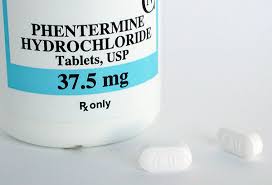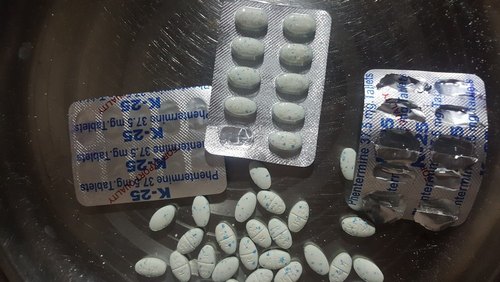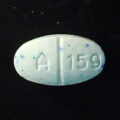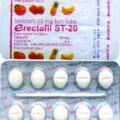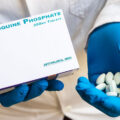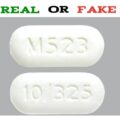Substandard and falsified medical products are by their very nature difficult to detect. They are often designed to appear identical to the genuine product and may not cause an obvious adverse reaction, however they often will fail to properly treat the disease or condition for which they were intended, and can lead to serious health consequences including death.
What Is Phentermine?
Phentermine is a prescription weight loss medication. It was approved by the FDA in 1959 for short-term use of up to 12 weeks for people older than 16. In the 1990s, phentermine was combined with other weight loss drugs. This drug combination was commonly called fen-phen. After reports of significant heart problems in users, the FDA pulled the other two drugs used in the treatment — fenfluramine and dexfenfluramine — from the market. Phentermine goes by the brand names Adipex-P, Lomaira, and Suprenza, or you can find it in combination medications for weight loss, such as Qsymia. A typical dose of Adipex is one 37.5mg capsule in the morning before breakfast. Adipex capsules contain the active ingredient phentermine hydrochloride.
It’s a controlled substance due to its chemical similarities to the stimulant amphetamine — making it available only with a prescription. Your doctor may prescribe phentermine if you’re obese, meaning that your body mass index (BMI) is greater than or equal to 30. It may also be prescribed if you’re overweight with a BMI greater than or equal to 27 and have at least one weight-related condition, such as high blood pressure, high cholesterol, or type 2 diabetes.
How Does Phentermine Work?
Phentermine belongs to a class of drugs called “anorectics,” also known as appetite suppressants. Taking phentermine helps suppress your appetite, thereby limiting how many calories you eat. Over time, this can lead to weight loss.
While the exact mechanisms behind the appetite-reducing effects of phentermine remain unclear, the drug is thought to act by increasing neurotransmitter levels in your brain. Neurotransmitters are your body’s chemical messengers and include norepinephrine, serotonin, and dopamine. When your levels of these three chemicals increase, your feeling of hunger decreases.
However, you may build a tolerance to the appetite-suppressing effects of phentermine within a few weeks. In that case, you should not increase your dose of the drug but stop using it altogether.
How long does it take for phentermine 37.5mg to work?
Phentermine is absorbed through the gastrointestinal tract and reaches peak concentrations in the blood in 3 to 4.4 hours, by which time you should start feeling the effects, alerting you that the drug is working.
Effective for Weight Loss
Several clinical studies have proven that phentermine can boost fat loss. The expected average weight loss with phentermine use is 5% of your initial body weight. Yet, over 12 weeks, it can be as high as 10%. This equates to a weight loss of 10–20 pounds (4.5–9 kg) for a 200 pound (90.7 kg) person.
In a meta-analysis of six studies, people who took the average dose of 27.5 mg of phentermine for 13 weeks lost an average of 13.9 pounds (6.3 kg) compared to 6.2 pounds (2.8 kg) in placebo groups. ALSO READ: Is Terfamex 30 Mg Good For Weight Loss
How to Spot Fake Phentermine 37.5mg
Falsified medical products may contain no active ingredient, the wrong active ingredient or the wrong amount of the correct active ingredient. They are also found to commonly contain corn starch, potato starch or chalk. Some substandard and falsified medical products have been toxic in nature with either fatal levels of the wrong active ingredient or other toxic chemicals. One of the most common tricks that companies use to sell fake phentermine is to create a product whose name is something very similar to phentermine, or a well-known brand of the popular weight loss pills.
A few examples are:
- Phentremine
- Phentarmine
- Phen375
- Fastin-XR
None of these products contain real phentermine. They are not an equitable alternative for what you would receive from an actual doctor.
Also, remember that phentermine is only available with a doctor’s prescription. Real phentermine is a schedule IV controlled substance and the laws regulating its sale are in-place to protect you. If a product is sold online as “over the counter phentermine” either it’s not real phentermine, or it’s being sold illegally. Either way, you don’t want those pills.
Identifying a substandard or falsified medical product
Some falsified medical products are almost visually identical to the genuine product and very difficult to detect. However, many can be identified by:
- examining the packaging for condition, spelling mistakes or grammatical errors;
- checking the manufacture and expiry dates and ensuring any details on the outer packaging match the dates shown on the inner packaging;
- ensuring the medicine looks correct, is not discolored, degraded or has an unusual smell;
- discussing with your pharmacist, doctor or other healthcare professional as soon as possible if you suspect the product is not working properly or you have suffered an adverse reaction; and
- reporting suspicious medical products to your National Medicines Regulatory Authority.
Substandard and falsified medical products and the Internet
Unregulated websites, social media platforms, and smartphone applications can also be direct conduits of substandard and falsified medical products. Risks to consumers are significantly increased when obtaining medical products from unlicensed and unregulated sources.
Consumers should be cautious of the following:
- spam email advertising medicines
- lack of authenticity; no verification logo or certificate
- spelling mistakes and poor grammar on the packaging
- websites that do not display a physical address or landline
- websites offering prescription only medicines without a prescription
- suspiciously low-priced products.
Checklist for medicines purchased online
- Is it exactly the medicine ordered?
- Is it the correct dosage?
- Is the packaging in good condition, clean, with a patient information leaflet and in the language in which it was advertised?
- Does the medicine look, feel and smell as it should?
- Are security seals intact with no signs of tampering?
- Does any customs declaration or postal label declare the contents as medicines?
- Does the batch number and expiry date on the primary internal packaging match the batch number and expiry date on the secondary (external) packaging?
- Have you noticed any unusual activity on your credit card since the purchase?
ALSO SEE: How to Spot A fake A 159 Pill


